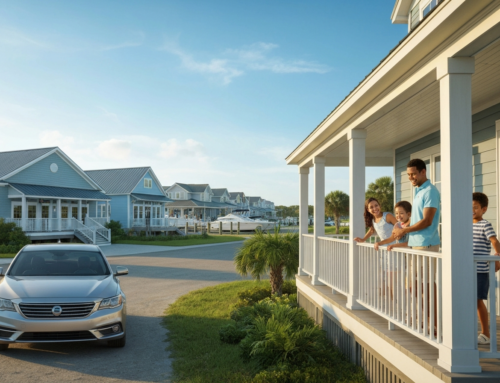As you age, the importance of financial security becomes increasingly clear, particularly for seniors over seventy. While many assume that life insurance is something to consider only during your younger years, having life insurance later in life can be equally important. Whether you live in Wilmington, Greenville, or Myrtle Beach, securing a life insurance policy in your seventies can offer peace of mind, ensuring that your loved ones are financially protected and that end-of-life expenses don’t become a burden.
In this article, we will cover the essential aspects of life insurance for seniors over seventy, exploring different types of policies, the benefits of coverage, and key considerations to keep in mind. Understanding these factors can help you make the best decision for your financial future and your family’s well-being.
1. Why Life Insurance is Still Important After Seventy
Life insurance is often seen as a tool for younger individuals with families and mortgages, but it remains crucial as you age. While certain financial responsibilities may have decreased by the time you reach your seventies, such as paying off your home or children’s education costs, there are still essential financial needs to consider.
For seniors over seventy, life insurance can help cover the costs of:
- Final expenses: Funeral and burial costs can be significant, often ranging between $7,000 and $15,000. Life insurance ensures that your loved ones won’t be burdened with these expenses.
- Medical bills and long-term care costs: If you accumulate medical debt or need long-term care, a life insurance policy can help alleviate the financial strain on your family.
- Leaving a financial legacy: Whether you want to leave an inheritance or contribute to a grandchild’s education fund, life insurance can help ensure your legacy lives on.
For example, if you’re living in Charleston, securing life insurance now ensures that any end-of-life expenses or debts won’t burden your family in the future.
2. Types of Life Insurance for Seniors Over Seventy
There are several types of life insurance policies available for seniors over seventy, each with its own benefits. The most common types include:
- Term Life Insurance: This policy covers a specific term, such as 10 or 20 years, and pays out a death benefit if you pass away during that term. While term life insurance is generally more affordable, premiums may be higher for seniors due to age. However, if you’re in good health, this could still be a viable option, particularly if you only need coverage for a set period.
- Whole Life Insurance: Whole life insurance provides coverage for your entire life and includes a cash value component that grows over time. While it tends to be more expensive than term life insurance, the lifetime coverage and potential to build cash value can be a significant benefit for seniors.
- Guaranteed Issue Life Insurance: This type of policy is ideal for seniors with health concerns, as it doesn’t require a medical exam. While the premiums tend to be higher and the death benefit smaller, guaranteed issue policies offer a way to secure coverage regardless of your health status.
- Final Expense Insurance: Also known as burial insurance, this type of whole life policy is designed specifically to cover end-of-life expenses, including funeral costs and medical bills. Premiums are typically affordable, and coverage amounts are usually lower, but it provides peace of mind knowing your final expenses will be taken care of.
For seniors in Wilmington or John’s Island, exploring these different policy options can help determine which plan best suits your financial goals and health situation.
3. The Importance of Choosing the Right Coverage Amount
Choosing the right coverage amount is critical when selecting life insurance in your seventies. The amount of coverage you need will depend on several factors, including your financial obligations, debts, and the legacy you wish to leave for your family.
When determining the right coverage, consider the following:
- Final expenses: Estimate the cost of your funeral, burial, and any outstanding medical bills.
- Existing debts: If you still have a mortgage, credit card debt, or other loans, make sure your policy covers these financial obligations.
- Income replacement: While you may not need to replace income at this stage in life, you may want to provide financial support for a spouse or dependents.
- Legacy: If leaving an inheritance for loved ones or charitable organizations is important to you, factor this into your coverage amount.
For example, if you’re living in Concord, your cost of living and family obligations will help guide your decision on how much coverage you need to leave behind.
4. Health Considerations and Medical Exams
As you age, health becomes a key factor in determining your life insurance options and premium rates. Many traditional life insurance policies require a medical exam as part of the application process. The results of this exam will determine your eligibility for certain policies and influence the cost of your premiums.
For seniors in good health, undergoing a medical exam can help you qualify for better rates. However, for those with pre-existing conditions or health concerns, a guaranteed issue policy may be a better fit, as it doesn’t require a medical exam.
It’s important to weigh your options carefully. If you’re in good health and live in Greenville, you may benefit from a term or whole life policy that offers lower premiums. Conversely, if health is a concern, a final expense or guaranteed issue policy ensures you still have coverage, albeit at a higher cost.
5. Cost and Affordability of Life Insurance for Seniors
While life insurance premiums tend to be higher for individuals over seventy, there are still affordable options available. The cost of your policy will depend on factors such as your age, health, the type of coverage you choose, and the amount of coverage needed.
To keep costs manageable, you can:
- Opt for a final expense policy, which tends to have lower premiums and is specifically designed for covering funeral and burial costs.
- Consider a term life policy if you’re in good health and need coverage for a limited period.
- Shop around and compare quotes from multiple providers to find the best rates for your needs.
If you’re living in Myrtle Beach, contacting an experienced life insurance provider like Beach Insurance LLC can help you explore different policies and find one that fits your budget without sacrificing essential coverage.
Life insurance for seniors over seventy is about more than just peace of mind—it’s about providing financial security for your loved ones and ensuring that end-of-life expenses don’t become a burden. By understanding the various policy options available and considering factors such as coverage amount, health status, and cost, you can make an informed decision that best suits your needs.
At Beach Insurance LLC, we are committed to helping seniors in Charleston, Wilmington, Greenville, and beyond find the right life insurance coverage. Contact us today at 843-718-0075 to discuss your options and secure a policy that gives you and your family the peace of mind you deserve.







Leave A Comment